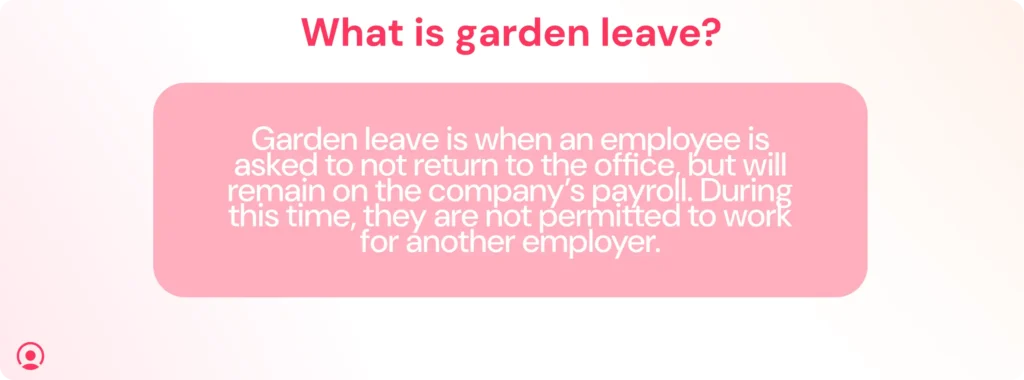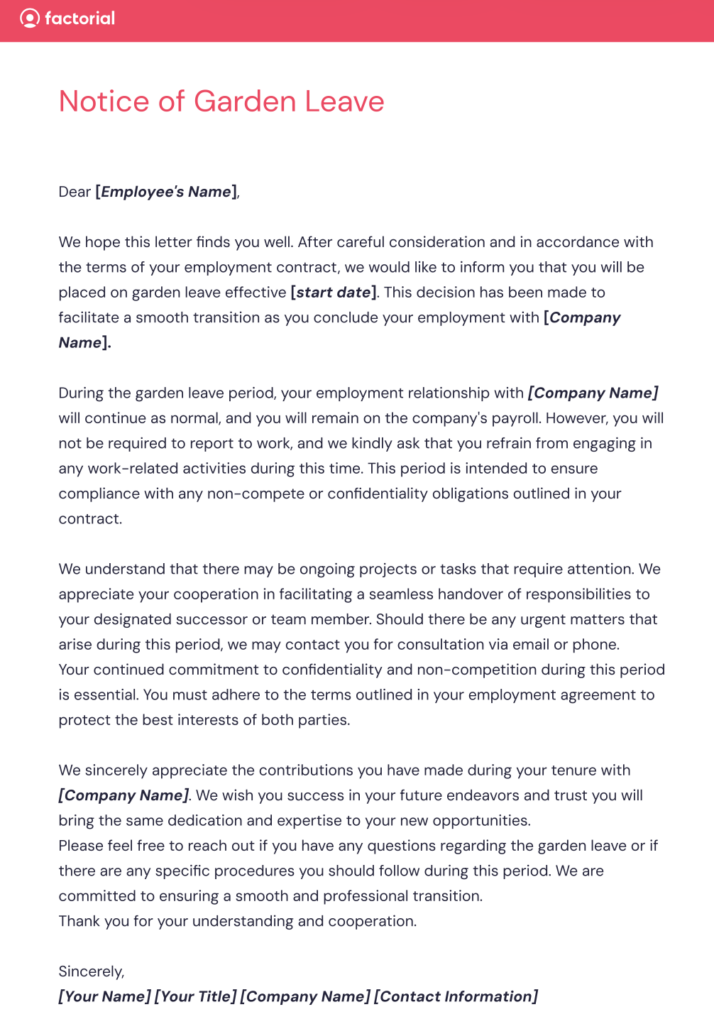It’s always tough to see an employee go, but sometimes it’s necessary so they can grow as professionals. In certain circumstances, you’ll want to place them on garden leave. Garden leave, also known as gardening leave, is a UK workplace measure that can be introduced during an employee’s notice period. Many employers and employees have misconceptions about the financial and practical implications of garden leave. In this article, we’ll help you understand what the UK clause garden leave means, its benefits, and when to apply it. We’ll clear up any doubts about garden leave and provide valuable insights to keep you informed about your company’s obligations in the UK.
What is Garden Leave?
Garden leave is a workplace practice that an employer may introduce during their employees’ notice period. During this transition period, employees who give or are given notice of employment termination, are informed to stay away from the office. This measure can be put into place whether an employee is leaving due to resignation, is being dismissed, or is made redundant.
During this period of garden leave the employee must not do any of the following:
- Come to the office (or the work premises)
- Carry out any work duties (from home or elsewhere)
- Communicate with clients or colleagues
Although the employee is not required to work or attend, they remain on the payroll and within the company throughout the entire gardening leave process.
Therefore, the employer remains responsible for:
- Keeping the employee on the payroll and paying their normal salary
- Providing them with existing contractual benefits such as pension schemes, gym memberships etc.

When Might Your Company Use Garden Leave?
A garden leave clause aims to protect the privacy and interests of the employer. Particularly during the last few weeks of the employee’s contract. In the UK, employers most commonly apply Garden Leave when an employee is leaving to work for a competitor. Thus, in order to protect the confidentiality of the company, the employer forces them to stay away. The company usually gives gardening leave to more senior employees who have access to sensitive information.
There are a number of factors to take into consideration before giving an employee Garden Leave. You must consider whether this has been stated in their employment contract, the level of access that the employee has to confidential information, and, most importantly, the financial costs. Remember to weigh the pros vs. cons when thinking about sending an employee on garden leave. Think to yourself: Will the company benefit from this?
How Long is Garden Leave?
Generally speaking, most companies assign a garden leave of up to six months to the employee. But as we mentioned, this duration depends on what is stated within the employment contract. Therefore, the length usually coincides with the notice period established within the employment contract.
Where does the term Gardening Leave come from?
The term gardening leave is fairly out of place when it comes to professional terminology. Why do we call it garden leave if employees aren’t actually gardeners? People commonly believe that although employees can’t work, they can pursue hobbies like gardening. As a result, the term “garden leave” was adopted to describe this specific professional absence.

What are the Benefits for UK Companies?
There are a number of benefits that gardening leave brings to the employer.
- Employee Availability: Ensuring that the employee in question is available to answer any queries regarding the handover
- Prevents Poaching: Preventing the employee from stealing existing colleagues or clients
- Protection of Data: Keeping any confidential information or data away from the employee
- Full Handover: Preventing an employee from working for another employer or themselves until the period of notice is over
Although there are several benefits for UK employers, it can be a significantly expensive measure and procedure.
How Does Garden Leave Affect Employees?
Employees on garden leave are entitled to work rights and benefits such as statutory sick leave, maternal leave, annual leave and other workplace laws. They remain on the payroll without going to the office or completing any work duties. On the other hand, they are not technically able to work for another company or themselves. Therefore, this time limits their professional abilities.
As an employee, you may ask yourself, “Can I request Garden Leave?” The answer is yes. An employee can ask for Garden leave as part of coming to a leaving agreement. Of course, if the employee contract states it explicitly, the employee can ask more easily.
Is Garden Leave Legal?
Garden leave is legal under UK law when it is properly outlined in an employee’s contract. Employers should meet UK employment laws and regulations compliance, by ensuring their Garden Leave Clause is well-explained within the employment contract. It’s the employer’s responsibility to ensure that they fully understand the impact that Garden Leave can have on their company. For this reason, it’s wise to seek legal advice before including it within the contract.
All in all, whether you choose to include Gardening Leave in your employment contract is entirely up to you and your company’s needs. As we mentioned, it’s not a cheap process, but it can help ensure company privacy.
Garden Leave Letter Example

UK Garden Leave Template
Subject: Notice of Garden Leave for [Employee’s Name]
[Company Logo] [Company Name] [Company Address] [Date]
[Employee’s Name] [Employee’s Position] [Employee’s Address]
Dear [Employee’s Name],
We hope this letter finds you well. After careful consideration and in accordance with the terms of your employment contract, we would like to inform you that you will be placed on garden leave effective [start date]. This decision has been made to facilitate a smooth transition as you conclude your employment with [Company Name].
During the garden leave period, your employment relationship with [Company Name] will continue as normal, and you will remain on the company’s payroll. However, you will not be required to report to work, and we kindly ask that you refrain from engaging in any work-related activities during this time. This period is intended to ensure compliance with any non-compete or confidentiality obligations outlined in your contract.
We understand that there may be ongoing projects or tasks that require attention. We appreciate your cooperation in facilitating a seamless handover of responsibilities to your designated successor or team member. Should there be any urgent matters that arise during this period, we may contact you for consultation via email or phone.
Your continued commitment to confidentiality and non-competition during this period is essential. You must adhere to the terms outlined in your employment agreement to protect the best interests of both parties.
We sincerely appreciate the contributions you have made during your tenure with [Company Name]. We wish you success in your future endeavors and trust you will bring the same dedication and expertise to your new opportunities.
Please feel free to reach out if you have any questions regarding the garden leave or if there are any specific procedures you should follow during this period. We are committed to ensuring a smooth and professional transition.
Thank you for your understanding and cooperation.
Sincerely,
[Your Name] [Your Title] [Company Name] [Contact Information]

Garden Leave FAQs
What is garden leave?
Garden leave is a workplace practice that an employer may introduce during their employees’ notice period. In this transition period, the company informs employees who give or receive notice of employment termination to stay away from the office.
What are the benefits of garden leave for employers?
Garden leave offers a range of benefits for UK employers, such as ensuring the employee’s availability to answer any queries regarding the handover, preventing the employee from stealing existing colleagues or clients, keeping confidential information or data away from the employee, and preventing an employee from working for another employer or themselves until the period of notice is over.
How does garden leave affect employees?
How long is garden leave?
The length of garden leave usually coincides with the notice period established within the employment contract. Most companies will assign this type of leave for up to six months to the employee, but this duration depends on what is stated within the employment contract.
Can employees request garden leave?
Yes, employees can request garden leave as part of coming to a leaving agreement. However, if the employee contract includes a garden leave clause, the employee can ask for it more easily.



